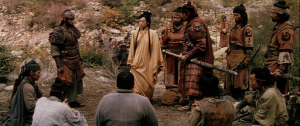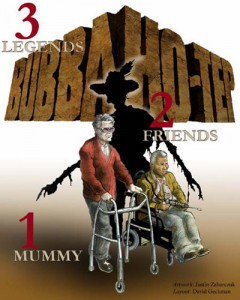The new decade showcased some of the very best of genre filmmaking and Fantasia was one step ahead of all other genre film fests in picking up some extraordinary films. Unfortunately, in 2002, the Imperial theater, which had housed the fest since its inception, was unexpectedly late on renovations and repairs. The festival had to be canceled, and the next year moved to Concordia University’s screening rooms (Henry F. Hall Alumni Auditorium, deSeve Cinema, D.B. Clarke Theatre). It was a major disappointment, and still leaves me longing that they will one day return to the Imperial, which in my opinion is the best cinema in the city. Here is the list of my fifteen favourite films from 2000-2005, with some honourable mentions below.
Session 9
If ever a place needed a horror movie made about it, it is the abandoned Danvers State Mental Hospital in Massachusetts. Built in 1878 on an isolated site in rural Massachusetts, it was a multi-acre, self-contained psychiatric hospital rumoured to have been the birthplace of the pre-frontal lobotomy. The hospital was the setting for the 2001 horror film Session 9, where an asbestos clean-up crew discover a series of nine tapes, which have recorded a patient with multiple personalities, all of which are innocent, except for number nine. With a low budget and no real special effects, Session 9 relies strictly on psychological horror to make its point. Director-writer Brad Anderson (The Machinist) knows how to pull all the strings to keep the audience guessing and squirming. This is one genuinely creepy thriller that builds to a nail-bitting climax.
Audition
This art-house cult horror film will be talked about for a long time to come. The last section of the film features some of the most harrowing, graphic closeups of torture ever put on celluloid, but even in its gore-filled shockingness, the film is a monumental achievement by a director willing to take chances and challenge his audience. Based on a novel by Ryu Murakami, Audition isn’t nearly as gory as Ichi the Killer, but it has to be Miike´s most disturbing and most powerful film. In fact it was listed at #11 on Bravo´s 100 Scariest Movie Moments. Not for the faint of heart.
Wild Zero (2000)
Wild Zero is the 2000 Japanese “Jet rock ‘n’ roll” zombie horror comedy cult classic, directed by Tetsuro Takeuchi, and starring the Japanese garage punk band Guitar Wolf. Borrowing many elements from other popular B-movies such as Psychomania and Evil Dead 2, Wild Zero would best be described as The Ramones remaking Night of the Living Dead for Troma studios. A film that is exuberantly silly, wears its influences on its sleeve, never looks cheap (despite the minimal budget) and is bursting with unstoppable energy from start to finish.
Bubba Ho-Tep
If you’re tired of conventional horror movies, try Bubba Ho-Tep, a cinematic oddity from director Don Coscarelli. Elvis Presley (Bruce Campbell), is an old man living in an East Texas retirement home, having switched identities with impersonator Dan Haff some time before his apparent death, but never got the chance to switch back. He teams up with fellow resident Jack (Ossie Davis) who believes himself to be John F. Kennedy and the two of them face up to an evil Egyptian mummy who has has chosen their retirement home as a hunting ground for souls on which to revive. Kitschy, lowbrow, and aggressively low-budget; Bubba Ho-Tep is a one-of-a-kind film experience. Featuring a bravura lead performance by Bruce Campbell, Bubba is a smart comedy that dares to take on the sublime and the ridiculous, succeeding on both counts with equal balance.
Memories of Murder (Salinui chueok)
The real-life events which the film uses as a springboard saw 10 women raped and murdered within a close radius in a small town in Gyeong-gi province, south of Seoul, during 1986-1991. The victims ranged from a 13-year-old school girl to a 71-year-old grandmother; the cause of death ranged from strangulation to stabbing; and one cadaver was bizarrely found to have nine pieces of peach stuffed inside her vagina. The unknown perpetrator was dubbed South Korea’s first serial killer. Memories of Murder is an unusual combination of police procedural docudrama, dark comedy film noir, psychological study, political allegory and atmospheric thriller. The result is a tense, old-school crime pic with a dark comedic edge and Memories still in my eyes remains the very best Korean film ever made.
The Birthday
 Directed by Eugenio Mira
Directed by Eugenio Mira
A young man attends his girlfriend’s father’s birthday party held at a luxury hotel. Just as they arrive, weird things start to happen and guests and hosts alike become exceptionally aggressive. Shot in real time (a la Hitchcock’s Rope), The Birthday begins as an extremely unusual black comedy only to slowly unravel into a horror film reminiscent of Rosemary’s Baby. Director Eugenio Mira quietly introduces its horror aspects with a deliberately campy approach until the half-way mark, shifting to a darker tone thereby escalating the tension to an unforgettable climax of complete terror. From its opening titles to the abrupt ending, The Birthday is a gem waiting to be discovered. A slick, good-looking picture beautifully photographed in cinemascope with award-winning art direction and ingenious sound design geared for maximum discomfort. This Spanish horror film, shot in English stars an international cast and at the centre is none other than Corey Feldman doing an odd, feature-length Jerry Lewis impersonation (a la The Bellhop). Feldman’s performance, easily the strangest in his career, reaches surprising (even cartoonish) levels of intensity. This film is quirky, campy and carries a hypnotic and seriously creepy atmosphere. One of the most unique and refreshingly inventive genre films. Director Eugenio Mira put it best at the 2004 screening at the Fantasia Film Festival when he quoted Back to the Future and said, “You may not like it but your kids are going to love it.”
–
36th Chamber of Shaolin
Gordon Liu (Kill Bill) stars as an anti Manchu government rebel who, after taking refuge from the Manchu oppressors at the Shaolin Temple, ultimately spreads the Shaolin fighting techniques to the masses. The 36th Chamber of Shaolin is a movie that takes its varying fight facets very seriously. The training, in particular, is flawlessly executed, using a combination of cinematic methods to amplify the aesthetic qualities. The director disregards the montage of conventional quick shots, slow motion and close ups, instead utilizing a series of impressively long takes, adding flow and realism to the fights. The 36th Chamber of Shaolin is arguably one of the greatest offerings of The Shaw Brothers Studios’ prolific production career of over 900 pictures – and is a landmark kung fu film.
Azumi
Lovers of Asian cinema should love Azumi. A slick, relentless, violent yet beautiful genre piece with breathtaking stunt choreography and impressive wirework by Yuta Morokaji that makes the fight sequences in Kill Bill seem tame. Aya Ueto stars as the young samurai assassin admirably doing most of the samurai sword stunts while she carves her way through a body count that rivals any three average samurai flicks.
Musa The Warrior

Genre: War, Epic, Martial Arts
In short, The Warrior is one of the two finest war epics, along with Terrence Malick’s The Thin Red Line (1998), to appear in the past thirty years. Realistic, subtle and relentlessly grim, it captures the essence of war in all its blood and glory. The battle scenes alone make The Warrior worth a watch for anyone who loves martial arts and adventure films.
Sympathy For Mr. Vengeance (Boksuneun naui geot)
Directed by Chanwook Park
 Sympathy is the first installment of Park’s now-famous trilogy on the theme of violent revenge, the second being the deranged masterpiece Oldboy, and the third being the underrated Lady Vengeance. Park possesses an auteur’s eye for detail and framing. His compositions are simply unrivaled by most modern filmmakers. In this supremely gritty hardboiled thriller set in Asia’s underground world of illegal organ transplants, one misfortune piles hard upon another in a breathless domino effect. Sympathy is hauntingly original, brutally nihilistic and one of the best Korean films to ever screen at Fantasia.
Sympathy is the first installment of Park’s now-famous trilogy on the theme of violent revenge, the second being the deranged masterpiece Oldboy, and the third being the underrated Lady Vengeance. Park possesses an auteur’s eye for detail and framing. His compositions are simply unrivaled by most modern filmmakers. In this supremely gritty hardboiled thriller set in Asia’s underground world of illegal organ transplants, one misfortune piles hard upon another in a breathless domino effect. Sympathy is hauntingly original, brutally nihilistic and one of the best Korean films to ever screen at Fantasia.
Cha no aji, (The Taste of Tea)
Fans of Yasujiro Ozu will absolutely love The Taste Of Tea. Katsuhito Ishii (Shark Skin Man and Peach Hip Girl and creator of the animated sequence in Kill Bill Vol. 1) writes, directs and edits this quirky comedy. Unlike his previous work, Taste Of Tea is best suited for connoisseurs of art-house films. It offers a constant assault on the senses through a series of imaginative images offered through a series of vignettes that may or may not be linked. Clocking in at two hours and 15 minutes, The Taste of Tea never seems long and never slows down.
Janghwa, Hongryeon (A Tale of Two Sisters)
Inspired by a Korean legend, this is the odyssey of two sisters, who after spending time in a mental institution, return to the home of their father and cruel stepmother. There’s a reason why Hollywood has been so busy in recent years remaking Asian horror movies. There’s more rank dread, inexplicable cutaways, overwhelming suspense and and inscrutable mystery in this South Korean psychological thriller than in most American mainstream horror films of the past 10 years. Mixing classic horror in the vein of Hitchcock and Argento, A Tale of Two Sisters is a groundbreaking film, and well worth seeking out by fans of Asian horror.
Visitor Q’
With Visitor Q’ , Takashi Miike has broken enough social and cultural taboos to make the jaws of even the most jaded modern viewers drop in disbelief. A loose remake of Pasolini’s Teorema, Visitor Q’ features scenes of incest, sodomy, heroin use, family violence, prostitution, murder and necrophilia. Still, the film has a lot to say. Visitor Q eventually reveals itself as a critique of reality TV, social decay and the need for traditional family roles.
Akira
What is there left to say about Akira that hasn’t been said? One of the most influential anime films of all time, Akira is best seen on the big screen, and thanks to Fantasia, fans of the genre had the chance to do so. It’s rightfully considered one of the greatest accomplishments in sci-fi storytelling. Regardless of if you think it is the best anime or not, Akira is responsible for introducing the world to the genre.
Save The Green Planet
A funny and wildly inventive hybrid of various genres, Save the Green Planet is a visually ingenious hybrid melding of horror, black comedy, revenge thriller and science fiction. Save the Green Planet showcases outstanding performances, a terrific score (reminiscent of Bernard Herrmann’s style) a punk rock version of “Somewhere Over the Rainbow,” vibrant energy, awe-inspiring cinematography and impressive visual effects from a first-time director.
Honourable Mentions:
Other memorable memories at Fantasia included its world premiere of the mock-doc The Blair Witch Project, as well as two amazing animated features Millennium Actress and Metropolis. The incredibly popular Tarantino fave J.S.A, Joon-ho Bong’s first feature film Barking Dogs Never Bite, festival winners Uninvited and Los sin nombre and the French comedy/horror Dead End. Three more worthy mentions are Undead by the Spierig brothers, the Korean fight film Crying Fist andAlexandre Aja French New Wave sensation High Tension.













